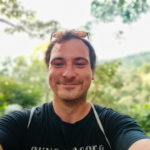Green Coding - Session I
- 11.10.23
- 15:30 - 17:00
- Chair : Volker Wohlgemuth

Software Life Cycle Assessment (SLCA) in the wild
- Geerd-Dietger Hoffmann
- Green Coding Berlin
- Hilpoltstein
- 15:30
- Hilpoltstein
- 16:00
- German
The workshop investigates the integration of technology and sustainability, focusing on incorporating Green Coding into curricula. It explores challenges, opportunities, and potential implementations. The workshop comprises in-depth discussions about initial efforts introducing Green Coding through a course at HTW Berlin, titled “Design and implementation of a lecture teaching current Green Coding approaches and practices at HTW Berlin,” offering foundational insights. Additionally, a presentation on integrating Green Coding into existing study programs provides practical applications. Participants are encouraged to share experiences and insights into integrating Green Coding into curricula, with qualitative inputs analyzed for a comprehensive understanding. Outcomes will shape academic guidelines for wider dissemination. Join this transformative platform shaping the future of tech education, uniting sustainability and technology through Green Coding. It welcomes researchers, educators, and curriculum developers passionate about sustainable tech education, valuing your contributions to the discourse on Green Coding’s educational impact.

Design and implementation of a lecture for teaching current Green Coding approaches and practices at the HTW Berlin
- Dennis Junger
- HTW-Berlin
- Hilpoltstein
- 16:00

- Volker Wohlgemuth
- HTW-Berlin
- Hilpoltstein
- 16:20
Unser Workshop beleuchtet hierbei neben dem Stand der Technik zukünftige Implementationsmöglichkeiten und die damit verbundenen Chancen und Hindernisse.
Workshop-Highlights:
Aktuelle Beispiele: Mit einem Eröffnungs-Talk zu ersten Implementierungsversuchen eines Green Coding Kurses an der HTW-Berlin mit dem Titel „Design and implementation of a lecture of teaching current Green Coding approaches and practices at the HTW-Berlin” sowie der folgenden Vorstellung einer aktuellen Masterarbeit zum Thema “How can Green Coding concepts be implemented into the curricula of existing study programs?” wird Ihnen für die folgende Diskussion beziehungsweise Experteninterviews eine Gundlage und Einstieg gegeben.
Experteninterviews: Die Teilnehmer sind eingeladen, ihre persönlichen Erfahrungen und Reflexionen zur Integration von Green Coding in Curricula zu teilen. Diese qualitativen Erkenntnisse werden methodisch erfasst, analysiert und ausgewertet um vertiefte Einsichten in den Implementierungsprozess zu gewinnen. Die erfassten Ideen und Ergebnisse werden folgend in akademische Leitlinien verarbeitet und veröffentlicht.
Seien Sie Teil dieser wissenschaftlichen Erkundung und gestalten Sie die Zukunft der Technologie mit einem fundierten Ansatz zur Integration von Green Coding in Curricula. Dieser Workshop richtet sich an Forschende, Pädagogen:innen, Curriculum-Entwickler:innen und alle, die sich für die Verknüpfung von Nachhaltigkeit und Technologiebildung in der Lehre interessieren.
